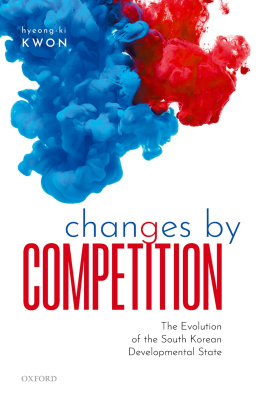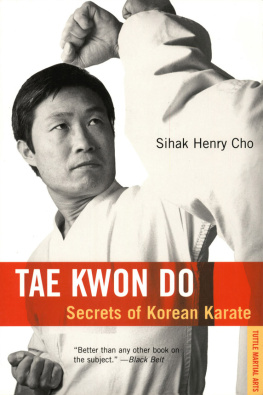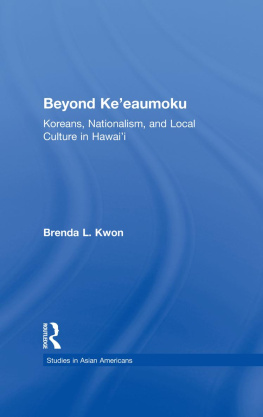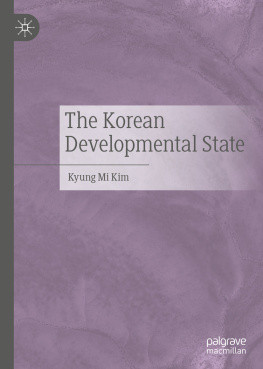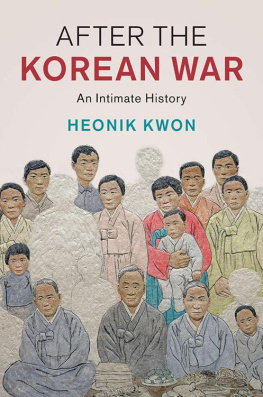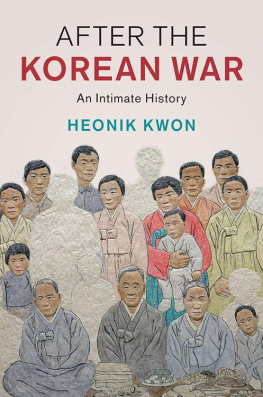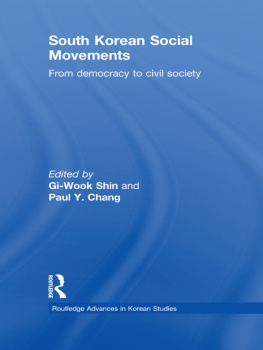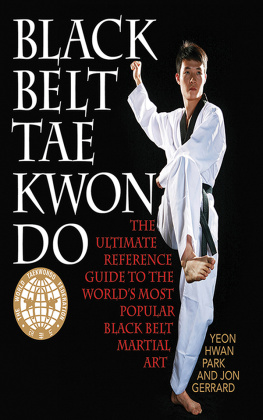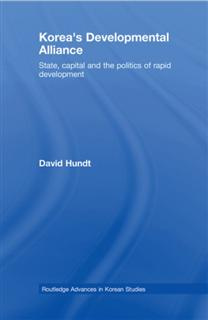Changes by Competition

Great Clarendon Street, Oxford, OX2 6DP, United Kingdom
Oxford University Press is a department of the University of Oxford. It furthers the Universitys objective of excellence in research, scholarship, and education by publishing worldwide. Oxford is a registered trade mark of Oxford University Press in the UK and in certain other countries
Hyeong-ki Kwon 2021
The moral rights of the author have been asserted
First Edition published in 2021
Impression: 1
All rights reserved. No part of this publication may be reproduced, stored in a retrieval system, or transmitted, in any form or by any means, without the prior permission in writing of Oxford University Press, or as expressly permitted by law, by licence or under terms agreed with the appropriate reprographics rights organization. Enquiries concerning reproduction outside the scope of the above should be sent to the Rights Department, Oxford University Press, at the address above
You must not circulate this work in any other form and you must impose this same condition on any acquirer
Published in the United States of America by Oxford University Press
198 Madison Avenue, New York, NY 10016, United States of America
British Library Cataloguing in Publication Data
Data available
Library of Congress Control Number: 2020952299
ISBN 9780198866060
ebook ISBN 9780192635617
DOI: 10.1093/oso/9780198866060.001.0001
Printed and bound by
CPI Group (UK) Ltd, Croydon, CR0 4YY
Links to third party websites are provided by Oxford in good faith and for information only. Oxford disclaims any responsibility for the materials contained in any third party website referenced in this work.
Preface
As I remember, it was in 2009 when I visited the International Center for Business and Politics (ICBP) in Copenhagen, Denmark that I began to take a look at Korea as my research subject, although Korea is my home country. Until then I had explored advanced democracies, including Germany, the United States, Ireland, and Nordic countries, doing field research for my dissertation and subsequent studies. I never forget the ICBPs sincere hospitality during my two visits. But most impressive was Professor Peer Hull Kristensens gentle smile and his thought-provoking question: Why are you wandering around these European countries, far away from your home country Korea? At that time, I could not reply immediately and avoided giving him an answer. However, what I avoided was not just an answer to Professor Kristensen, but more importantly, to myself. I wanted to avoid studying deeply the politics of my home country because Korea was divided into different political and ideological opinions. People I felt deeply attached to fought each other, forcing me to take one side or the other. I refused to take a side in such conflicts after studying abroad. However, I changed my mind about studying Korea, not only because my foreign acquaintances had continuously asked me about my home countryfor academics and policy-makers, Korea is an important test case for theoretical debates on economic development and democratization; but also, I knew that avoidance is not the best way to deal with the conflicts.
Conflicts in Korea are not tapering. On the contrary, they continue to amplify to the current day. People who lean toward democracy tend to disregard Koreas successful economic development which almost all emerging nations try to emulate, whereas people who emphasize Koreas successful economic growth tend to underestimate democracy, sometimes admitting authoritarianism for economic growth at the expense of democracy. While studying the prevalent theories on political economy, I discovered that the exclusive ideas of democracy versus economic development are not ordinary Koreans responsibility, but are based on academic theories. In particular, developmental state (DS) theories, which gained significant ascendancy in accounting for East Asian economic developments, hold that for successful economic development, the state should be unitary, cohesive, and unaffected by social forcesauthoritarianism strong enough to direct private actors with their unitary rationality.
However, through exploring the stories of successful economic development, I observed that in contrast to the DS theories, successful developmental states, including Korea, Japan, Taiwan, and China, are neither unitary nor cohesive, but fragmented and full of rivalry and conflicts, particularly among policy-making elites. Even the Park Chung Hee regime, regarded as an archetype of the DS cohesive state, was full of rivalry and conflicts among economic ministries, including the Economic Planning Board (EPB), the Ministry of Finance (MoF), and the Ministry of Commerce and Industry (MCI). Furthermore, I found that competition and conflicts among elites are not always bad for economic development, as shall be examined in this book. On the contrary, collective deliberation and pragmatic experiments through rivalry and competition among elites can significantly contribute to economic development through flexible institutional adaptability in response to new challenges resulting from ever-changing contexts of domestic and international political economy.

